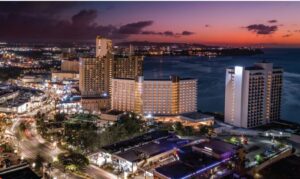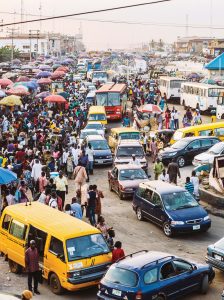 By Jason Meadors
By Jason Meadors
It was departure day for Nigeria, a three-week work trip I went on a few months ago. That day started out with a typical trip to the airport — not really stressed, but I was thinking: “What if something goes wrong?” This is part and parcel of the whole international work experience, at least for me. What if I forgot something? What if I didn’t pack the right cord for a piece of equipment? Or forgot a piece of equipment? Do I have all the right gear for the power differences? And oh, yes, I checked to make sure I have my passport for the 251st time.
Regarding the travel there: For some of these gigs, the client or paying party treats you like an integral part of the team. Sometimes not so much. For this Nigeria trip, they did, springing for business first class, which was particularly welcome on the Boeing 787 from my connecting flight in Houston to Lagos, Nigeria.
Business first class on that plane is sure comfortable. I had a glass of wine with dinner (that they kept offering to refill). I had my own television, and not the little one on the seat back in front of me, but a good-sized one in my little nook, with TV shows and movies on demand and all that stuff. And I didn’t have to jam my bag under the seat in front of me or in the overhead. I have shelves and cubbyholes for all my stuff.
And then, ah, the whole “resting while flying” thing. The little reclining icon on the controls by the seat shows a bed option. I didn’t believe it can lie down flat, but it really did, and I achieved a reclined sleeping position that, given the circumstances, is not terrible. Having flown coach about 99 percent of my traveling time, I can unequivocally state that sleeping in coach ranks somewhere between pretty terrible and downright awful.
International assignments are a sporadic thing for me. For some of my colleagues, it’s their bread and butter. I do envy those who fly constantly and have the miles to upgrade from economy when that’s all the client will buy. It makes all the difference to arrive reasonably comfortable and reasonably rested.
I was hoping to see some cool African landscape as we flew over the coast, but that was not to be. Clouds covered everything. The clouds broke up as we came closer, and it was odd not to see roads, grids of towns, or any sign of civilization. It’s sort of like flying over western Alaska, except this looks flat the whole way.
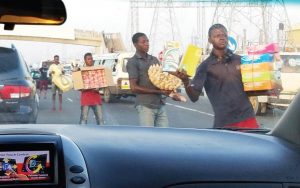 The airport at Lagos wasn’t anarchy — merely low-level chaos. After disembarking, the team I traveled with and I found ourselves in a fairly dark tunnel, finally making our way up to the immigration stations, where we were given the forms to fill out. We crouched around in the middle of the line, trying to do so. Once the forms were completed, we were ignored for a while by the immigration officers.
The airport at Lagos wasn’t anarchy — merely low-level chaos. After disembarking, the team I traveled with and I found ourselves in a fairly dark tunnel, finally making our way up to the immigration stations, where we were given the forms to fill out. We crouched around in the middle of the line, trying to do so. Once the forms were completed, we were ignored for a while by the immigration officers.
That was the start of the fun. Outside the airport, we had a chase truck complete with armed guards with our luggage in it and a bus to hold the lawyers and reporters. Then the bus ride started. It was interesting.
The main roads were paved, and all the side roads were dirt. Lagos is not a pretty town. What was most striking to me was there was lots of trash and lots of frenzied, aggressive driving. Pedestrians do not have the right of way. Street vendors walk down the active lanes between lines of cars that are stalled in traffic or moving slowly. The vendors push their various wares, sometimes carrying them on the tops of their heads.
The trip across town to the compound took about an hour and a half. I’d estimate our average progress at about 45 hpm (honks per minute). Most of the time, lane lines were a forgotten memory. There were a lot of roadside marketplaces with tented stalls, teeming with people.
The national car of Nigeria seems to be the VW bus. There are tons of them around, and not all in good shape, looking as tired as an 80-year-old factory worker, packed with goods and people. Lots of them were painted yellow, which seemed odd, until we figured that they were unmarked cabs. Well, unmarked but for the paint job. A number of times, the VWs cruising down the road featured the sliding door open, with one or two people hanging out to enjoy the breeze.
Our bus driver was fearless and stellar in his abilities. Maybe he can’t do what I can for a living, but I couldn’t do what he does either. The road experience made me wonder why more cars aren’t scraped and striped on the sides, or why more pedestrians’ bodies aren’t scattered about. Maybe they’re just all used to it and compensate appropriately, or maybe this was a good day.
We got to the compound, an island of cushiness in a sea of chaos. It was like an attractive Southern California subdivision, if the subdivision had a concrete-lined moat, guard towers, emergency assembly points scattered around the area, and a security briefing that told us what to do in case of gunfire. (Don’t check it out, and try to keep at least two walls between yourself and the gunfire.) The house to which I, another reporter, and one of the attorneys were assigned was done very nicely indeed. The depositions that I reported for those three weeks were in the same house. Shortest commute ever.
Sure, that’s all nice. But I hear you saying, “This is the JCR I’m reading, right? What about the reporting?”
The first day was simply nerve-wracking for me. Not because of the attorneys or witnesses (not yet, anyway), but because my realtime gear was acting up. I had done a dry run before I left home, I had done a dry run the day before the first job, and then when I had everything ready on the important day, the gear just wouldn’t cooperate. I went down my hardware and software checklists, A, B, C, D, [expletive deleted], and it’s still was not connecting. By then, everyone had shown up. I set up my backup system and got it going, but now the deposition is starting with the scent of frustration – and it was emanating from me.
The witnesses that I had were villagers from an area up the coast. Although I knew that English is the official language of Nigeria, I knew I couldn’t relax. Many of the villagers spoke their tribal language, and we needed an interpreter for that. Some of the witnesses could speak pidgin English, and so we had an interpreter for that. Some of the witnesses spoke English, but a heavily accented form that would have had me scratching my head, if my hands were not already busy. The interpreters had accents, too.
The second day of the job was better than the first. The equipment all decided to get in line and step in time and stayed that way for the rest of the assignment. I didn’t do anything differently. It just worked, even through the eight or so little blackouts that we had. And that was pretty much how the rest of the job went over the course of three weeks. Well, sometimes we went late, the accents were a constant struggle, and while I thoroughly enjoyed the attorney I worked with, he was focused, energetic, and didn’t need the breaks that we so cherish in order to recharge.
Through the witnesses, I learned a little about life in Nigeria. The deponents were from fishing villages. One was married, but not really, because he hadn’t paid the bride price. Another had kids — four boys and one girl. He was dismissive of the daughter and didn’t know how old she was. The towns’ heads was called king and referred to as Highness. And one village went to war against another, complete with gunfire and invasion and refugees. Toilets in one place were perched over the river, which carried away the waste (to another village downriver, presumably).
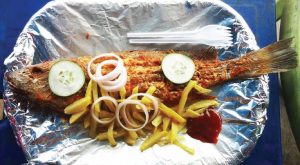 After some hard days of work, there was a consensus among the legal beagles — well, most of us — to get out and see what was outside of the compound. In Nigeria, going out to see the sights took some coordination, at least for our cautious hosts.
After some hard days of work, there was a consensus among the legal beagles — well, most of us — to get out and see what was outside of the compound. In Nigeria, going out to see the sights took some coordination, at least for our cautious hosts.
We staged with our new Nigerian friends who work for the corporation running the compound. We sallied forth in two SUVs, mercifully driven by Nigerians, with a chase car (black pickup), marked POLICE, complete with overhead lights. It was apparently vitally important that we stay together, because in the madcap, mad-dash Lagos traffic, whenever we’d get separated by other cars, there’d be a “WHOOP WHOOP” behind us — the siren of the chase car — and we’d rejoin.
At the roundabouts — oh, my. I’ve been taught that the cars in the roundabout have the right of way, and the cars joining traffic wait for an opening. Ha! Think more of a game of “chicken” with a generous seasoning of Demolition Derby. We were helped in our case by the chase car, lights flashing, jamming into the flow and running interference for us as adeptly as any All-Pro offensive lineman on an NFL team.
We got to the beach, a favored hangout of one of our hosts. The place was energetic in getting the plastic chairs and tables set up for us. The proprietors came around with a big dead fish on a platter. I was about to say, “No thanks,” when our host ordered five of them. Well, okay.
We walked out on the jetty, did some photo-taking at the far end, came back, and the fish started showing up. It was spicy and delicious. Well, at least it was merely spicy for our hosts and me. Another reporter on the team, Stephanie Leslie of Regal Reporting out of Orange County, Calif., announced that her mouth was on fire and took some good-natured ribbing from our Nigerian friends. The sweet potato fries that accompanied them were quite tasty. Later, we also chowed down on some beef prepared by a beachside barbecuer, coated with a spicy rub, more flavor than heat, also quite good.
The beach. Relative to my American sensibilities, it was a mixture of nice sand and a trash pit. The structures are a combination of reasonably functional, combined with ramshackle, dilapidated, and crumbling. Or crumbled.
The folks were all good-natured. I’m not gregarious, not in the United States, not in Nigeria, not much anywhere, but others in our group had no problems making new friends. That feeling of safety may have been enhanced by the guys from the chase car in their police uniforms carrying firearms.
Really, from that quiet afternoon, it’s hard to get across the variety we experienced: the entertaining kid rapper in the St. Louis Cardinals shirt, the onslaught of vendors coming to our table (I got some trinkets for my granddaughters), the sights along the roadside.
As the days wore on, the biggest reporting challenge turned out to be the accent. I tried to prep, I really did. One of the major town names is Port Harcourt. It pretty well comes out porked, but it sounds like a porked where I felt I was lucky to have made out that much of the word, until they say they flew from there, and I thought, “Oh, that can’t be right,” and of course I tried to figure it out while they kept moving along in their soliloquy.
Or another main town, Yenagoa. I looked at the word list and read Yen-a-go-a. I heard the attorneys say, Yen-a-go-a, and I thought, “Yeah. I got this.” Then I heard the witnesses talking about going to Engwa and selling fish in Engwa, and I struggled along with that and the rest of the vocabulary, and finally I started hearing a little Yeh at the start and I realized that Engwa is actually Yenagoa.
So much for the prep.
The attorneys had been interviewing local witnesses and personalities for weeks, or months, or maybe years, and their ears were tuned. Mine were not. But even the attorneys could get taken aback. One memorable exchange:
A. This is our seashore. Where —
Q. This is your —
A. — where we come at. Yes.
Q. Is your sister, did you say?
A. Seashore.
Q. Seesaw?
A. Seaside, yes.
Q. Seaside.
A. Yeah.
When you can’t tell seashore from sister from seesaw from seaside, you’re in for one great treat.
Rough drafts went out as soon as possible, which meant before the start of business the next day and preferably before the evening is done. Yup, all 300 pages, or whatever the count is, working through that accent.
Okay, I’m really not complaining. It was a good, interesting gig, and I feel privileged to have been on it.
We pretty much took depositions every workday, and since it was Nigeria, that included the Fourth of July. The worst depositions, the most dreaded, were when the witness would come in with attorneys’ assurances that no interpreter was needed that day. Because they were generally wrong.
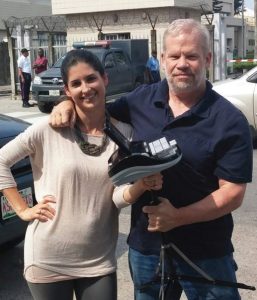
My first day’s job (after the realtime issue) was the baptism in fire, well over 300 pages saturated with my mental “Huh?” I heard a word, I spent a second trying to figure it out, I finally did based on the content, and by then, the speaker is 15 words further along in the speech, 10 of which I’m going through the same tortured analysis.
The other reporting stuff was pretty mundane, as these things go: realtime to counsel, rough drafts to counsel, relatively quick turnaround. However, as the days go on, mundane translates to burdensome. We kept taking depos every day and found the work piling up, swamped with returns from the scopists who couldn’t understand the witnesses any better than we could and returns from the proofers who were baffled as well. All the while, we’re keeping exhibits together, doing any techno-troubleshooting, and trying to find something to eat and a few hours to sleep. The equation of roughs, realtime, and transcript production started generating a sum value of fatigue.
The three-reporter team, with three different CAT systems, was great and fired on all cylinders. The attorneys were easy to get along with. Three of them were Brits, leading to interesting discussions on the state of things on the island across the pond.
And the witnesses, hard as they are to take down, were nevertheless fascinating. This experience certainly gave me a different perspective on life. Let me say, when I listened to the witnesses talking about going out to the swamp or river to do their personal business, when they were literally eating what they killed or pulled out of the dirt, when they told of drinking water pulled out of the ground, and the concept of phones, refrigerators, and televisions were laughable, I saw my life differently. I listened, with a mixture of fascination and sadness, to witness after witness coming in from their first plane ride, in a big city for the first time, from their hardscrabble existence.
So, you might want to ask, was it worth it?
It was good to get home after three weeks of constant heavily overtime days, but this experience was hugely informative and rewarding.
But, yeah, I’d go back.
Jason Meadors, FAPR, RPR, CRR, CRC, is a freelance reporter in Fort Collins, Colorado. He also writes fiction and currently has five titles on Amazon.






